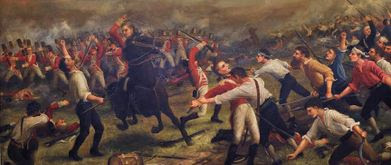So we managed to get our first game in on Land on Fire, my strategic board game of the Irish rebellions of 1796-98. We didn't managed to finish it, but the experience provided some valuable insights.
Two French armies managed to land in Ireland, under Hoche and Humbert, both being defeated. Bad weather helped delay Humbert's landing, and he was defeated having moved to Castlebar, by the combined armies of Cornwallis and Moore. I made an error here, allowing Moore to join the battle - Cornwallis should have faced Humbert on his own.
Overall we felt events favoured the British, but looking through the deck, I think it is still worth keeping things as is for a second play. I think we got lucky. Bad weather was ever a factor for the French and I'd like to leave that in.
Early on the rebels looked to have a good position, with a major break out in Dungarvan. This was mainly United Irishmen with some Whiteboys and with further Jacobin outbreaks in surrounding towns and in Cork. Further insurrections in Kilkenny and Tullow meant the British had to fight their way down towards Dungarvan in a campaign resembling island hopping in the Pacific.
Above: The French (Humbert in blue) have landed at Westport with three Jacobin bands. Cornwallis (purple) is at Castlebar with Abercromby (brown) in Kilalla. Humbert advanced to Castlebar the next turn.
Moore and Lake were just planning their attack on Dungarvan when the Harvest card came up, leading to the Whiteboys elements heading off to bring in the harvest and letting Lake move in against the remaining hard core rebels.
A lot of the game was spent chasing after isolated instances of rebellion. There was quite a lot of rebel activity in Ulster on the Londonderry through to Belfast axis, and it was probably Belfast where we came closest to losing a regiment of regulars. But generally I never felt the British were seriously in danger of losing control.
Above: Later stages, a British garrison has been set up in Dublin, while Lake is tackling some United Irish in Tullamore. I'm pondering whether to prohibit the British garrison in Dublin gambit, which considerably reduces the risk of losing Dublin to rebels.
Some of the big changes therefore are going to be as follows:
The number of brigade assets cards which can be held by a general is to be reduced from 10 to six.
Once the brigade assets deck is finished, the players have to make do with what they have. Note that we included two Jokers in the deck for this game, which served as 'duds' - i.e. promised resources which failed to appear. In future, Jokers will also mean a roll on the Rebellion table.
We debated the cost of naval movement from 4 APs to 5 APs, but decided to keep it at 4. It was very useful for moving troops around.
The Rebellion table is going to be extensively re-written. I'm going to make the insurrection patterns for the Defenders of Ireland and United Irishmen more focused, and probably the Jacobins as well. The Whiteboys will remain more scattered and opportunistic as they had no central or provincial organisation to speak of.
Pillaged markers will remain on the board once placed. The food supplies asset card made it too simple for the British to deal with Pillaged areas. Effectively this will now be permanent damage and a sort of clock tracking the game. Food supplies asset card will be removed.
The number of rebel markers from a faction that need to be on the map for the British to lose is cut from 25 to 15.
I also had a thought for an additional rule: the players currently test for French landings when a court card comes up in the events deck (4+), but I thought I'd make things more dangerous by varying the roll needed for a landing on D6: Jack 4+, Queen 3+ and King 2+.
Also under consideration is the addition of a Dutch army to the game. The First Directory leaned on the Dutch (the Batavian Republic), who were at this stage French allies, to equip an invasion force for Ireland in 1797. This was aborted once the Dutch fleet was defeated at Camperdown by Admiral Duncan on 11 October.



It will be interesting to see how things balance up in your next play.
ReplyDelete